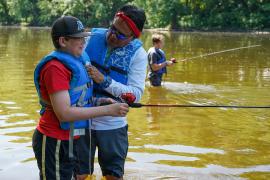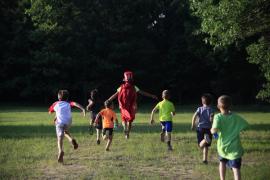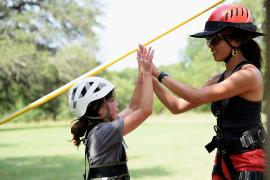Dear Camp Director,
You’ve spent all spring recruiting me, and I’m finally here, in the door. I’m interested in camp, you’re interested in hiring me, and you start talking about the coming summer. I know months of work have gone into getting me and my fellow new staff members to where we are right now. You start the meeting and my eyes grow wide.
I’m expected to be at camp three weeks after school ends for pre-camp orientation and training. I hope I’m rested because it’s been a long semester, and I haven’t seen my high school friends in months. Then for the next eight weeks I need to eat, sleep, live, and breathe camp. Oh, and don’t forget about post-camp clean-up! I learn I’ll be supervising a group of campers from sunup to sundown, and since this is a sleepaway camp, I’ll also be responsible for their overnight needs. I hope I get older kids, so I don’t have to deal with bedwetting or 3:00 a.m. homesickness . . .
I have to keep my campers safe while ensuring they’re entertained, learning new skills, building friendships, and growing as individuals. I need to work well with my peers, whom I haven’t even met yet, and role model positive behavior whether it’s 60° and rainy, or 95° and muggy, whether I slept last night or not. Calling out sick is extremely inconvenient due to tight ratios and asking for a week off is even more inconvenient for the same reason. Who will watch my bunk if I go on my annual family vacation to the beach? Finally, you tell me the pay is low, but I’m going to have the best summer of my life and you can’t wait to bring me in to this incredible camp family!
Honestly, at this point, I’m considering running for the hills or ghosting you all together. Your expectations are too high! I have never been to camp before. I don’t know any of the people, or traditions, and I’m skeptical that I’ll survive the summer, let alone have the best summer of my life. You tell me that you have high rates of returning staff because staff who have been at camp for multiple years are invested. They’ve witnessed the magic of camp firsthand. They’ve had the transformative experiences you know camp can create. They have struggled and grown and have chosen to come back to continue that growth in themselves and in the campers. Maybe that’s true, but I haven’t even seen the property yet!
Is there some way to make this process less stressful? If you ask me, here are a few tips:
- Draw your line in the sand. Where can you give or accommodate, and what is too much? Large camps with hundreds of staff may be able to hire someone who needs two weeks off. Small camps may not, but may be able to accommodate one week off, or two long weekends. Recognize that being lenient in my first summer can help ease me in, and I’ll return the next year ready to make a bigger commitment.
- Identify other opportunities to involve me in camp before the summer. Engaging new staff members in weekend programming, spring break camps, or registration events gives us more exposure to your camp and how you operate with less commitment. This can help us feel more prepared for a bigger summer commitment.
- Recognize that commitment from a first-year staff member likely looks different than commitment from a returning staff member. Returning staff often come back to camp excited to take on new challenges, try new things, and improve on what they did the past summer. As new staff, we are just trying to keep up and find our place and need to know that nerves and fears are normal, expected, and totally okay.
I’m really terrified, but also really excited to work with you this summer.
Sincerely,
A first-year staff member
This post is adapted from “Exposing The Heart of Camp: Is There a Camp Staffer in All of Us?,” presented by Clemson University students with the assistance of Dr. Gwynn Powell in November 2019 at SCamp Con, the online summer camp conference. Please check out more information here: ummercampcon.com/
This blog was written by Ali Dubin, MS ([email protected]), Katie Thurson ([email protected] ), and Gwynn Powell, PhD ([email protected]) as part of Project Real Job’s initiative to support camps with staff recruiting, hiring and retention efforts.
Photo courtesy of Camp DeWolfe in Wading River, NY
The views and opinions expressed by contributors are their own and do not necessarily reflect the views of the American Camp Association or ACA employees.




